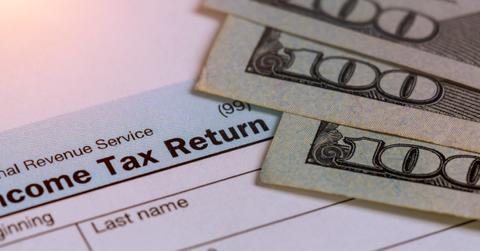What’s an “IRS TREAS 310” Tax Refund, and Why Did You Get One?
You may have noticed an "IRS TREAS 310" tax refund in your account. Here's what "IRS TREAS 310" means and why you received the deposit.
March 15 2023, Updated 2:05 p.m. ET

Tax season is in full swing, and many early filers have already received their tax refunds. However, how these appear on your bank statement can be confusing. For example, you might have received a deposit listed as "IRS TREAS 310" but may not know what it means.
When you file your income tax return, you estimate the refund (if any) due from the IRS to you. However, in some cases, the amount might be lower or higher than your calculations. About 75 percent of U.S. filers get an annual tax refund from the IRS, and according to the agency, the average 2022 tax refund was $3,121. As of Feb. 2, 2023, the IRS had already sent out more than $15 billion in tax refunds.
Find out more about why a deposit from "IRS TREAS 310" is showing up on your bank statement and what a few other important IRS codes mean down below.
What's an "IRS TREAS 310" tax refund?

The "310" code refers to a transaction of a refund from a filed tax return in the form of a direct deposit. "IRS TREAS 310" is a normal automated clearing house (ACH) direct deposit refund from a filed tax return. Along with the 310 code, the IRS payment will include a description that differs depending on the payment type. The codes could be one of the following:
- "IRS TREAS 310 TAX REF"
- "IRS TREAS 310 TAXEIP3"
- "IRS TREAS 310 CHILDCTC"
A direct deposit with "TAX REF" is basically a refund from a filed return, including amended tax returns or IRS tax adjustments. The other two codes refer to economic impact payments and advance payments of child tax credits, respectively.
Did the IRS issue a refund for unemployment benefits?
The American Rescue Plan Act provided relief on federal tax on up to $10,200 of unemployment benefits a taxpayer collected in 2020. Usually, unemployment benefits are taxable, but the act waived the tax due to the COVID-19 pandemic. As most people eligible for the break filed their tax returns before the act came into effect, the IRS had to issue special tax refunds to eligible taxpayers.
The payments by the IRS started in May 2020 and continued thereafter. According to a Jan. 3, 2023, IRS press release, the agency has completed corrections of the 2020 tax year for those who overpaid taxes on the unemployment benefits they received.
The agency noted that it had to correct about 14 million returns, which resulted in roughly 12 million refunds being issued. The total amount refunded to those who overpaid taxes on unemployment benefits was $14.8 billion and the average refund was around $1,200.
You might receive other random deposits from the IRS.
A deposit labeled "IRS TREAS 310" isn't the only thing that has been leaving taxpayers scouring the internet for answers. There are plenty of other types of deposits taxpayers have received that have them questioning what it is and why they received it. For example, some taxpayers received a deposit from TPG Products.
TPG Products, an abbreviation for Santa Barbara Tax Products Group, is a company is known for processing tax refunds for those who opt to have their tax filing fees deducted from their refund. So, if you received a deposit from TPG Products, it's likely the remainder of your tax refund.
But, if you believe you received a tax refund out of error, you can simply repay the amount to the IRS. However, it's advisable that you contact the agency first before assuming it isn't money you are owed. The IRS works under strict rules and guidelines, but it does make mistakes. And sometimes, those mistakes, such as failing to issue a refund for a credit you were entitled to, may work in your favor.
